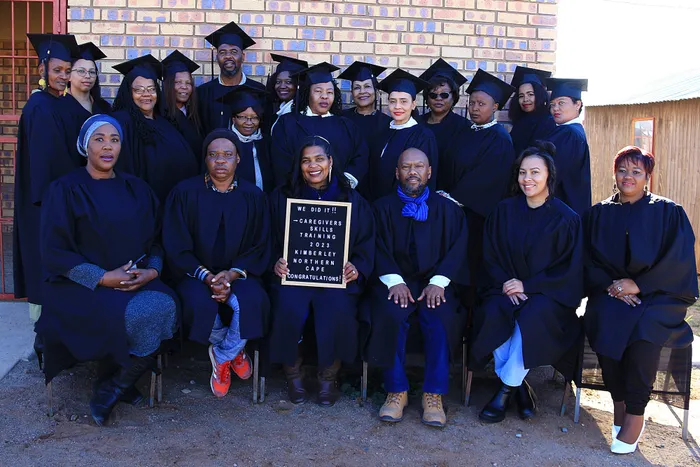Caregivers graduation will bring support for families struggling with neurodiversity issues

The 14 graduates of the Caregiver Skills Training programme (back) are seen here with the programme’s facilitators (seated). Picture: Lance Fredericks
ON WEDNESDAY morning, a small group of caregivers received certificates after completing an in-depth Caregiver Skills Training programme at the Ebenezer Assemblies of God church in Homevale.
The 14 graduates enthusiastically showed off their certificates, but more than the pieces of paper in their possession – that they definitely can be proud of – this group is now able to provide an important service in the City.
Speaking to the DFA, Elfreda Baartman, regional development officer for the Northern Cape at Autism South Africa, spoke about the importance of the programme for the graduates as well as the facilitators.
“Being part of the programme as facilitators made us realise that creating awareness for neurodiversity should be our mission going forward. Knowledge is definitely power,” Baartman said.
The in-person 12-session CST programme was first field-tested in the North West province through the Diamond Families Project – a partnership between the Department of Social Development, Autism South Africa, and the University of Cape Town.
The programme focuses on training caregivers on how to use everyday play and home activities and routines as opportunities for enhanced interaction and participation, development and learning. The sessions specifically address communication, engagement, daily living skills, challenging behaviour and caregiver coping strategies.
Globally, more than 50 million children have a developmental disability such as intellectual disability, autism, or communication disorder. Without appropriate support, these conditions often limit children’s ability to benefit from the educational and social opportunities that others take for granted.
They are often denied access to school and are more likely to experience neglect or abuse. Their caregivers are often stigmatised, isolated and impoverished. In addition, most children with developmental disabilities and their families do not have access to the care and support they need.
Training programmes for caregivers of children with developmental disabilities can be particularly beneficial in increasing caregivers’ confidence and parenting skills. They can also lead to improved well-being of both caregivers and children.
The programme adopts a family-centred approach and is designed to be delivered by trained specialist or non-specialist care providers (for example, community-based workers or caregivers) as part of a network of health, education and social services for children and their families.
Related Topics: